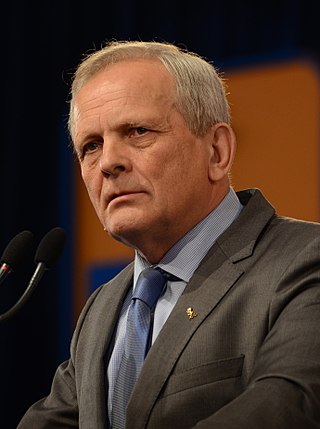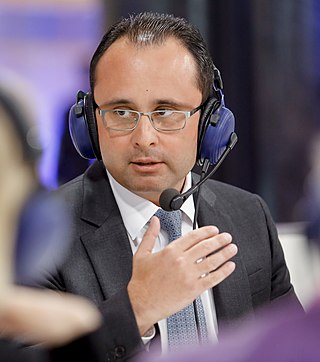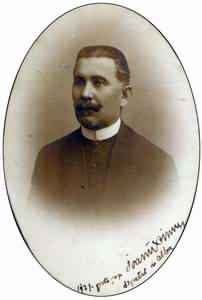| Part of the Politics series |
 |
|---|
| |
The Hungarian Union (Romanian : Uniunea Maghiara, UM) was a political party in Romania representing the Hungarian minority.
| Part of the Politics series |
 |
|---|
| |
The Hungarian Union (Romanian : Uniunea Maghiara, UM) was a political party in Romania representing the Hungarian minority.
The party was established on 6 July 1921, with Sámuel Jósika as its first president. [1] Its activities were suspended by the Romanian government on 30 October, based on a historical law banning political parties based on ethnic lines. [1] On 15 January 1922 István Kecskeméthy became its new president, and the government allowed the party to resume activities shortly before the March 1922 elections. [2]
In the elections the party won three seats in the Chamber of Deputies. [3] However, it was banned against shortly after the election. [2] On 20 November it was agreed to merge with the Transylvanian People’s Party to form the new Magyar Party. [2]
| Election | Chamber | Senate | Position | ||||
|---|---|---|---|---|---|---|---|
| Votes | % | Seats | Votes | % | Seats | ||
| 1922 | 3 / 372 | 0 / 148 | 8th | ||||

Romania's political framework is a semi-presidential representative democratic republic where the Prime Minister is the head of government while the President, according to the constitution, has a more symbolic role, is responsible for the foreign policy, signs certain decrees, approves laws promulgated by the parliament, and nominates the head of government. Romania has a democratic, multi-party system, with legislative power vested in the government and the two chambers of the Parliament, more specifically the Chamber of Deputies and the Senate. The judiciary is independent of the executive and the legislature. From 1948 until 1989, the communist rule political structure took place in the framework of a one-party socialist republic governed by the Romanian Communist Party (PCR) as its only legal party.
After the Communist rulership ended and the former Communist dictator Nicolae Ceaușescu was executed in the midst of the bloody Romanian Revolution of December 1989, the National Salvation Front (FSN) seized power, led by Ion Iliescu. The FSN transformed itself into a massive political party in short time and overwhelmingly won the general election of May 1990, with Iliescu as president. These first months of 1990 were marked by violent protests and counter-protests, involving most notably the tremendously violent and brutal coal miners of the Jiu Valley which were called by Iliescu himself and the FSN to crush peaceful protesters in the University Square in Bucharest.

The Social Democratic Party is the largest political party in Romania. It is also the largest social democratic political party in the country. It was founded by Ion Iliescu, Romania's first democratically elected president at the 1990 Romanian general election. It is currently part of the National Coalition for Romania (CNR), which is a big tent grand coalition comprising also the National Liberal Party (PNL). The CNR formerly included the Democratic Alliance of Hungarians in Romania (UDMR/RMDSZ) until mid June 2023.

The National Liberal Party is a Christian democratic and socially conservative political party in Romania. Re-founded in mid January 1990, shortly after the Revolution of 1989 which culminated in the fall of communism in Romania, it claims the legacy of the major political party of the same name, active between 1875 and 1947 in the Kingdom of Romania. Based on this historical legacy, it often presents itself as the first formally constituted political party in the country and the oldest of its kind from the family of European liberal parties as well.
Liberalism and radicalism are important political movements in Romania. Many political parties from these traditions have had important historical roles and substantial support, including representation in the Parliament of Romania. Not all Romanian political parties relevant to this tradition have explicitly described themselves as liberal or radical.

The Democratic Alliance of Hungarians in Romania is a political party in Romania which aims to represent the significant Hungarian minority of Romania.

The Democratic Party was a social democratic and, later on, liberal conservative political party in Romania. In January 2008, it merged with the Liberal Democratic Party (PLD), a splinter group of the National Liberal Party (PNL), to form the Democratic Liberal Party (PDL).

The Romanian Democratic Convention was an electoral alliance of several democratic, anti-communist, anti-totalitarian, and centre-right political parties in Romania, active from 1991 until 2000. The most prominent leaders of the CDR throughout the 1990s were by far Corneliu Coposu, Ion Rațiu, and Ion Diaconescu, all three members of the Christian Democratic National Peasants' Party (PNȚCD) - successor and political heir to the National Peasants' Party (PNȚ), active in the Kingdom of Romania between 1926 and 1948).

The Christian Democratic National Peasants' Party is a agrarian and Christian democratic political party in Romania. It claims to be the rightful successor of the interwar National Peasants' Party (PNȚ), created from the merger of the Romanian National Party (PNR) from the then Austro-Hungarian-ruled Transylvania and the Peasants' Party (PȚ) from the Romanian Old Kingdom.

The First Austrian Republic, officially the Republic of Austria, was created after the signing of the Treaty of Saint-Germain-en-Laye on 10 September 1919—the settlement after the end of World War I which ended the Habsburg rump state of Republic of German-Austria—and ended with the establishment of the Austrofascist Federal State of Austria based upon a dictatorship of Engelbert Dollfuss and the Fatherland's Front in 1934. The Republic's constitution was enacted on 1 October 1920 and amended on 7 December 1929. The republican period was increasingly marked by violent strife between those with left-wing and right-wing views, leading to the July Revolt of 1927 and the Austrian Civil War of 1934.

Parliamentary elections were held in Romania on 30 November 2008. The Democratic Liberal Party (PDL) won three more seats than PSD in the Chamber of Deputies and the Senate, although the alliance headed by the Social Democratic Party (PSD) won more votes and a fractionally higher vote share. The two parties subsequently formed a governing coalition with Emil Boc of the PDL as Prime Minister.

Presidential elections were held in Romania in 2009. They were the sixth presidential elections held in post-1989 Romania. The first round took place on 22 November, with a run-off round between the top two candidates Traian Băsescu and Mircea Geoană on 6 December 2009. Although most exit polls suggested a victory for Geoană in the runoff, the authorities declared Băsescu the narrow winner with 50.33% of the votes. To date, it is the closest presidential election in the political history of Romania.

The Magyar Party was a political party in post-World War I Romania.

The Democratic Liberal Party was a liberal-conservative political party in Romania. The party was formed on 15 December 2007, when the Democratic Party (PD) merged with the Liberal Democratic Party (PLD). On 17 November 2014 the PDL officially merged into the National Liberal Party (PNL), ceasing to exist. The PDL was associated with Traian Băsescu, who was previously leader of the PD and President of Romania from 2004 to 2014.

Cristian Silviu Bușoi is a Romanian physician and politician. A member of the National Liberal Party (PNL), he was a member of the Romanian Chamber of Deputies for Timiș County from 2004 to 2007, and was a Member of the European Parliament from 2007 to 2013, a position he regained in 2014. He currently chairs the European Parliament's Committee on Industry, Research and Energy (ITRE).

Radu-Anton Câmpeanu was a Romanian politician who was also jurist and economist by profession, after graduating from the University of Bucharest (UB) in November 1945, specializing in constitutional right. During the interwar period and up until 1945, he was the leader of the National Liberal students' association at nationwide level.

The People's Party, originally People's League, was an eclectic, essentially populist, mass movement in Romania. Created by World War I hero Alexandru Averescu, it identified itself with the new politics of "Greater Romania" period, and existed for almost as long as Greater Romania did. The PP broke with the antiquated two-party system, creating a wide coalition of lobbies, and advertised itself as the new challenge to the National Liberal Party (PNL). The group was held together by Averescu's charisma, and was popularly known as partidul averescan, "the Averescan party".
The National Democratic Hungarian-Szekler Party was a political party in Romania.

The Federation of Socialist Parties from Romania was a political alliance in Romania.

Ioan Simu was an Austro-Hungarian-born Romanian Greek-Catholic priest and politician.